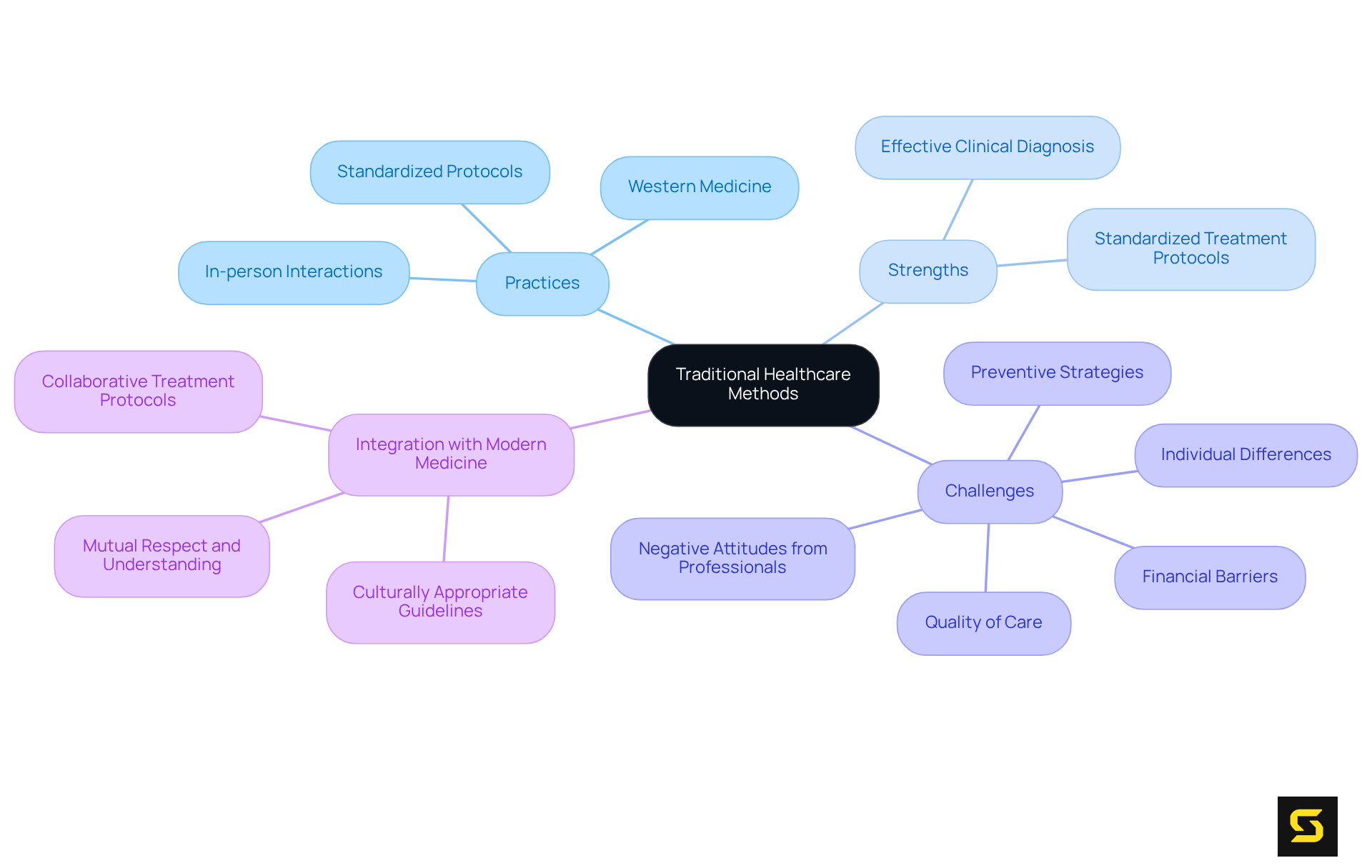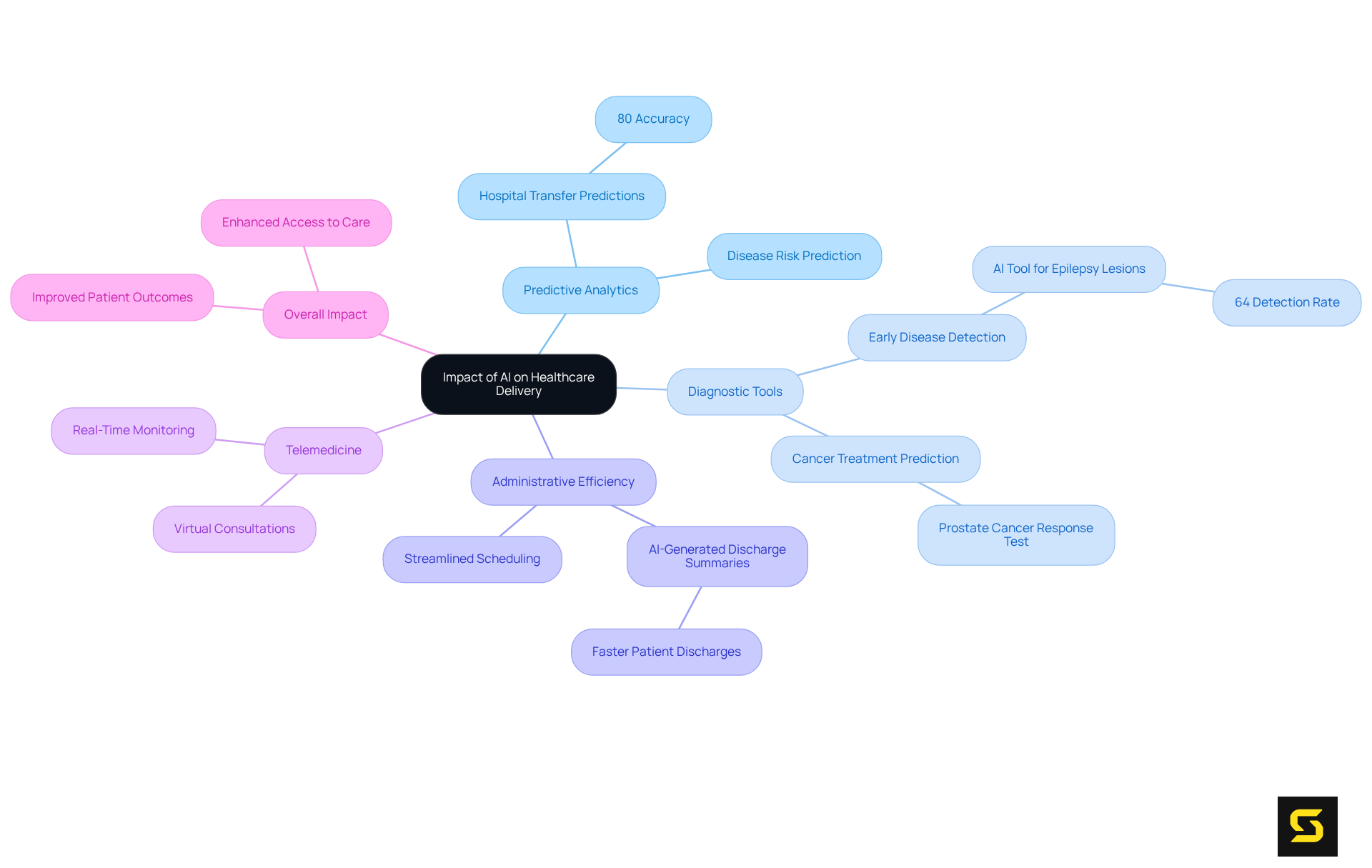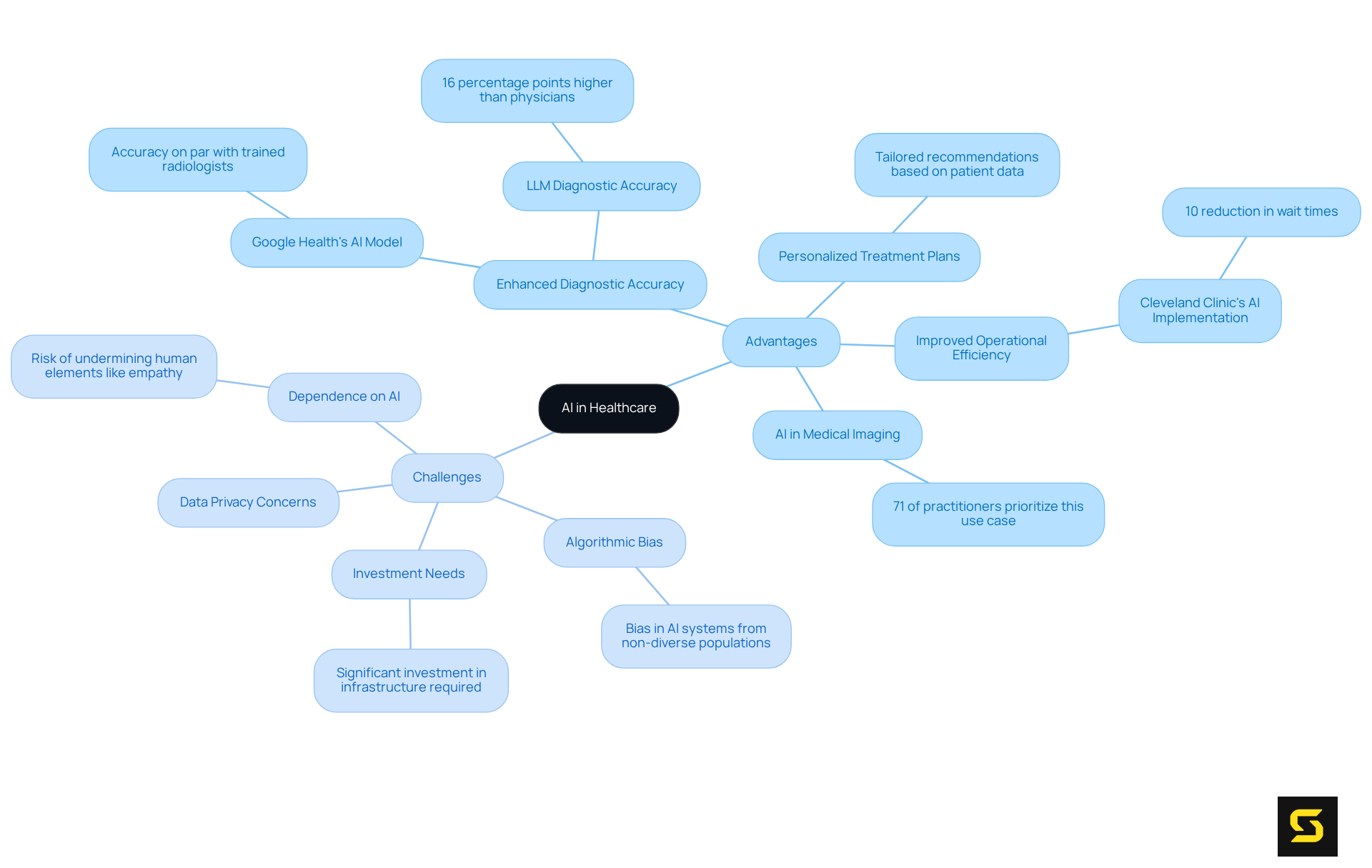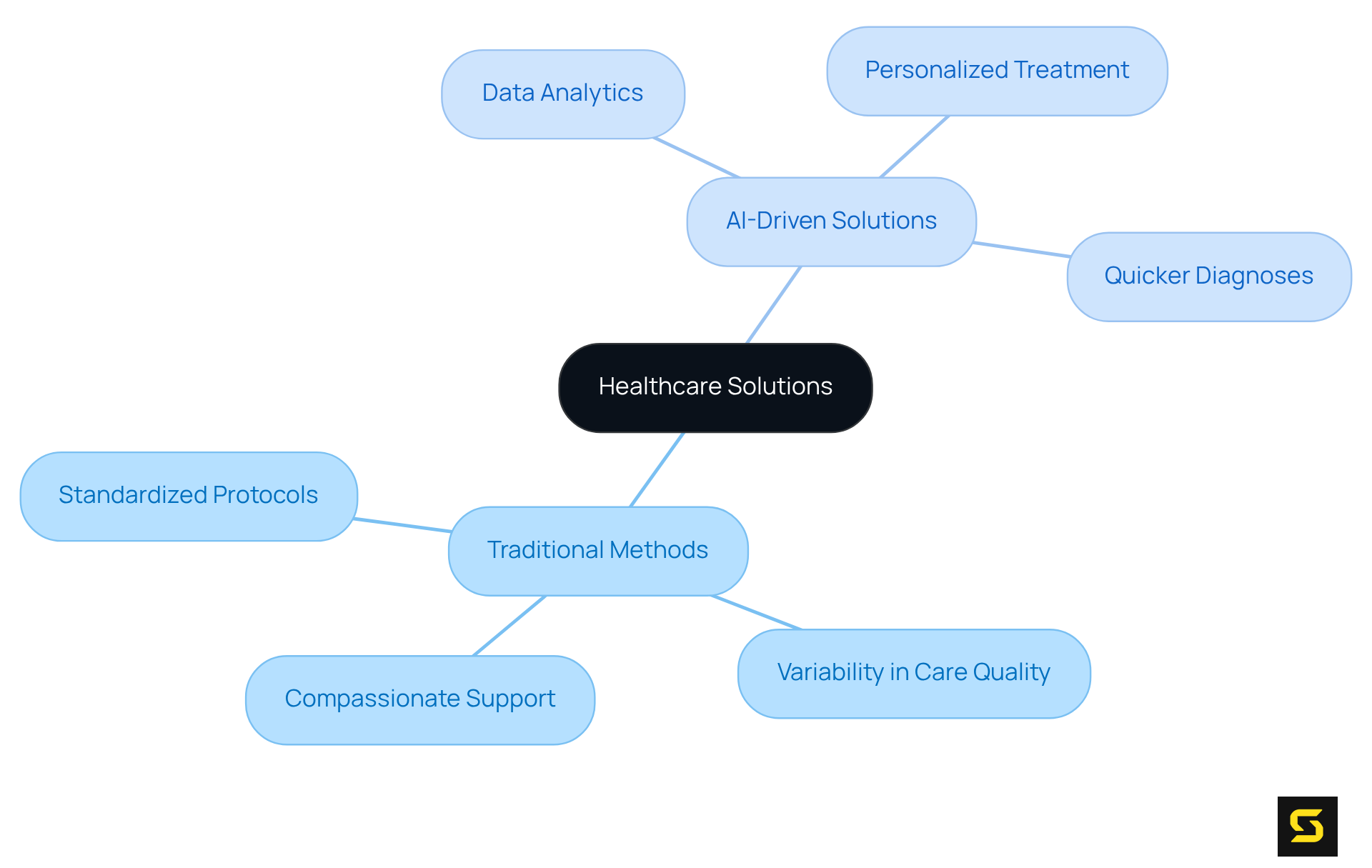Overview
This article presents a compelling comparison between traditional healthcare methods and the innovations introduced by artificial intelligence (AI), underscoring the strengths and weaknesses inherent in each approach.
Traditional methods, while foundational, often fall short in personalization and can be time-consuming. In contrast, AI significantly enhances diagnostic accuracy, operational efficiency, and patient engagement.
This analysis suggests that a hybrid model, integrating both traditional and AI-driven approaches, may yield the most effective healthcare solutions. Such a model not only addresses the limitations of conventional methods but also leverages the strengths of AI to create a more responsive and efficient healthcare system.
Introduction
The healthcare landscape is experiencing a profound transformation as traditional methods face intensified scrutiny amid rapid technological advancements. The integration of artificial intelligence heralds a new era, offering the potential for improved diagnostic accuracy, tailored treatment plans, and enhanced operational efficiency—serving as a beacon of hope for both healthcare providers and patients. Yet, as AI innovations promise to revolutionize patient care, critical questions emerge:
- Can technology genuinely replace the human touch in medicine, or must we find a delicate balance between the two?
This article explores the comparative strengths and weaknesses of traditional healthcare practices versus AI-driven solutions, illuminating the path toward a more effective and compassionate healthcare system.
Overview of Traditional Healthcare Methods
Traditional medical methods encompass a variety of practices that have evolved over centuries, prominently featuring Western medicine, which relies heavily on clinical diagnosis and standardized treatment protocols. These methods emphasize in-person interactions between medical professionals and individuals, employing techniques such as physical examinations, laboratory tests, and prescribed medications.
While conventional healthcare has proven effective in numerous scenarios, it faces . For instance, nearly half of the population in low-income nations seeks assistance from traditional healers for mental health concerns, underscoring the critical need for integration and cooperation between traditional and modern practices to enhance overall well-being.
The reliance on standardized treatment protocols often overlooks individual differences, resulting in suboptimal outcomes in certain situations. Furthermore, the inherent variability in human judgment can compromise the quality of care, particularly in critical situations. A notable challenge lies in the reactive nature of conventional medical systems, which may not adequately address preventive strategies or comprehensive patient management.
Consequently, although conventional techniques have laid the groundwork for contemporary medical care, they frequently struggle to meet the demands of an increasingly complex medical environment. The World Health Organization's recognition of traditional medicine further underscores the importance of incorporating these practices into modern medical systems.

Impact of AI on Healthcare Delivery
AI and healthcare are fundamentally transforming the provision of medical services by harnessing advanced technologies that enhance efficiency, precision, and user engagement. Algorithms powered by AI can analyze extensive datasets to uncover patterns and predict health outcomes, empowering healthcare providers to make swift, informed decisions. A compelling study in Yorkshire revealed that AI could accurately forecast which individuals required transfer to the hospital in 80% of instances, underscoring AI's predictive capabilities.
Furthermore, AI-driven diagnostic tools have shown remarkable efficacy in early disease detection, leading to significantly improved outcomes for patients. The 2024 World Economic Forum report highlighted that the digital health platform Huma could reduce readmission rates by 30% and decrease the time spent reviewing patients by up to 40%, showcasing the substantial impact of AI and healthcare on outcomes.
Additionally, AI streamlines administrative tasks such as scheduling and billing, allowing medical professionals to dedicate more time to patient care. The integration of AI in telemedicine has , particularly in underserved areas, by facilitating virtual consultations and real-time monitoring. An innovative AI tool developed by Chelsea and Westminster NHS Trust generates discharge summaries, enabling hospitals to discharge patients more quickly and efficiently.
Overall, the influence of AI and healthcare on medical service delivery is profound, providing innovative solutions that effectively address numerous limitations of traditional methods. As Hoda Eldardiry emphasizes, the demand for practical, technology-driven solutions in medical services has never been more critical.

Advantages and Challenges of AI-Driven Solutions
AI and healthcare are experiencing a revolution through AI-driven solutions that provide substantial advantages such as enhanced diagnostic accuracy, personalized treatment plans, and improved operational efficiency. Notably, AI technologies excel in with remarkable precision, frequently outpacing human radiologists in detecting anomalies. A prime example is Google Health's AI model, which showcases diagnostic accuracy on par with trained professionals in breast cancer detection. Furthermore, AI systems are capable of generating tailored treatment recommendations based on individual patient data, facilitating more effective and personalized care. In fact, 71% of medical practitioners prioritize medical imaging and diagnostics as their leading AI use case, while 54% emphasize clinical decision support, underscoring the increasing reliance on AI for personalized treatment strategies.
Nevertheless, the implementation of AI in the medical sector is not without its challenges. Data privacy concerns, algorithmic bias, and the need for significant investments in technological infrastructure pose considerable obstacles. A recent study indicated that 36% of respondents believe AI has provided a competitive edge; however, numerous organizations face difficulties in measuring the success of AI deployments from the outset. Additionally, there is a risk of becoming overly dependent on AI, potentially undermining essential human elements of support, such as empathy and trust. Healthcare leaders stress the necessity of formulating a clear strategy for AI and healthcare that balances value capture—enhancing existing operations—with value creation, which focuses on generating new revenue streams. Addressing these challenges is crucial for the successful integration of AI into medical systems, ensuring that innovations enhance rather than detract from patient care. Moreover, the issue of data fragmentation and the need for harmonized data are critical for realizing AI's transformative potential in the medical field.

Comparative Analysis: Traditional vs. AI-Driven Healthcare Solutions
When comparing conventional healthcare methods with , several key differences emerge. Traditional methods often rely on standardized protocols and human judgment, which can lead to variability in care quality and a lack of personalization. In contrast, solutions that integrate AI and healthcare leverage data analytics to provide tailored recommendations and enhance diagnostic accuracy.
For instance, while a conventional approach may prescribe a one-size-fits-all treatment, AI can analyze a patient's unique genetic makeup and medical history to suggest a more effective, personalized treatment plan. Furthermore, conventional medical services can be time-intensive, featuring extended wait periods for appointments and outcomes. AI and healthcare technologies can expedite processes, resulting in quicker diagnoses and treatment decisions.
Despite these benefits, conventional methods play a vital role in delivering compassionate, person-centered support that AI cannot imitate. Ultimately, the most effective healthcare systems may integrate both approaches, utilizing AI and healthcare to enhance traditional practices while preserving the essential human elements of care.

Conclusion
The integration of AI into healthcare signifies a pivotal shift from traditional methods, with the objective of enhancing patient care through precision, efficiency, and personalization. While conventional practices have established a foundation for medical services, they frequently fall short in addressing the complexities and individual needs of patients. The emergence of AI technologies presents innovative solutions that can substantially improve health outcomes and streamline processes, ultimately transforming the landscape of healthcare delivery.
Insights from the comparative analysis reveal that traditional healthcare methods, while effective in numerous ways, are often constrained by their reliance on standardized protocols and human judgment. Conversely, AI-driven solutions utilize vast amounts of data to deliver tailored treatment recommendations and enhance diagnostic accuracy, effectively addressing critical shortcomings of conventional practices. Furthermore, AI's capacity to boost operational efficiency and broaden access to care, especially in underserved areas, underscores its potential to reshape the healthcare experience.
As the healthcare industry continues to evolve, adopting a hybrid model that merges the strengths of both traditional and AI-driven approaches may be essential for achieving optimal patient care. This integration not only preserves the vital human elements of compassion and empathy but also harnesses the power of technology to meet the increasing demands of modern healthcare. Stakeholders within the medical field are urged to explore these innovations and contemplate the best methods for implementation, ensuring that the future of healthcare remains both advanced and patient-centered.
Frequently Asked Questions
What are traditional healthcare methods?
Traditional healthcare methods encompass a variety of practices that have evolved over centuries, prominently featuring Western medicine, which relies on clinical diagnosis and standardized treatment protocols.
How do traditional medical methods operate?
These methods emphasize in-person interactions between medical professionals and individuals, using techniques such as physical examinations, laboratory tests, and prescribed medications.
What are some challenges faced by conventional healthcare?
Conventional healthcare faces challenges such as reliance on standardized treatment protocols that may overlook individual differences, variability in human judgment affecting care quality, and a reactive nature that may not adequately address preventive strategies.
What is the significance of traditional healers in low-income nations?
Nearly half of the population in low-income nations seeks assistance from traditional healers for mental health concerns, indicating a critical need for integration between traditional and modern practices.
How does the World Health Organization view traditional medicine?
The World Health Organization recognizes traditional medicine, highlighting the importance of incorporating these practices into modern medical systems to enhance overall well-being.
Why might conventional healthcare struggle in a complex medical environment?
Conventional techniques, while foundational for contemporary medical care, often struggle to meet the demands of an increasingly complex medical environment due to their limitations in addressing individual patient needs and preventive care.





